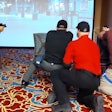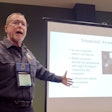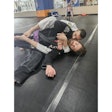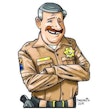 Photo courtesy of Michael Rayburn.
Photo courtesy of Michael Rayburn.
As law enforcement officers we find it hard to think of ourselves as "victims." We tend to think that robberies, burglaries, and home invasions happen to other people, not to us. After all, we're the cops. Who would be stupid enough to try to rob us? Unfortunately, the world is full of stupid criminals. And crime can affect anyone, even us.
Look at the statistics compiled by the FBI. The number one reason why law enforcement officers are killed off duty is being the victim of, or intervening in, a robbery or robbery attempt. Gang members have intentionally targeted an officer's house for a burglary "because that's where the guns are." In recent years we've also seen a rise in revenge-style killings against law enforcement.
Consider the recent case of Philadelphia police officer Moses Walker Jr. At the end of his shift, he was walking down the street to catch a bus roughly four blocks from his stationhouse in north Philly when two suspects approached him on the street. They attempted to rob him. In response Walker tried to draw his firearm but was shot several times and died from his injuries.
Think about this incident for a second. Now suppose you're not the intended target. What would happen? How would you react? Now how would you react to the possibility of two parolees following your wife and daughters home from the store to make them victims?
Hardening the Target
Violence can happen to any of us. There are evil people out there willing to do evil things, and some don't care if you're a cop or not. We may not be able to stop some criminal's violent intent, but we can make ourselves a harder target to hit so they'll pass us by for someone else. It may sound cold, but we all know that criminals are lazy. If it's between burglarizing the house with the fence, dog, and alarm system, or the house where the occupants don't lock the doors, we all know the bad guy is going to take the easy road. Make yourself and your loved ones that harder target.
Making you and your family a harder target to hit starts at home. There are a few simple things you can do to make everyone in your household safer. The first and easiest thing you can do is to always lock your doors. It doesn't matter if you live in the country or in the city, lock your doors. There have been many cases of criminals entering homes through unlocked doors. Granted, a locked door isn't going to stop a determined intruder, but it may slow him or her down long enough for you to grab your gun.
Which brings me to the following point. Always carry off duty and always have a firearm available in the home.
Off-Duty Carry
It shocks me to hear of officers who don't carry off duty or who don't even own an off-duty firearm. One of the best benefits of this job is being able to carry off duty in your jurisdiction, and now through the Law Enforcement Officer Safety Act we can carry concealed off duty anywhere in the country, even after we retire.
You should also practice with your off-duty firearms. Other than "qualifying" with the off-duty firearm, very few departments do any off-duty training. Rather than seeing how many holes you can punch in a paper target, do some legitimate training. Practice robbery drills where your hands are up and your back is to the target, forcing you to draw and pivot to the target. Practice drawing and holstering from the holster, and the location, that you carry your off duty gun in. This may get a little hairy if everyone shows up with a shoulder rig, but there are ways to safely get around it.
Home Defense
While we're on the topic of guns, how many of you have cleared your house with a replica firearm like a Blue Gun? You may know every inch of your home, but have you tried clearing it in the dark, with a firearm? Learn what boards squeak in the living-room floor and how to cut those corners in the hallway before you need to do it for real. Close your blinds before doing this so your neighbors don't think you've gone postal, but practice and be prepared.
Some other simple things to do in your home are to always keep your shades/blinds closed, especially after dark. Don't give the bad guys an opportunity to see the layout of your house, covet all the things you own, and know exactly where you are while you're home. During daylight hours you may be able to spot someone surveying your home, but once it gets dark someone can stand outside just a few feet from a lighted room, and you'd never see them from the inside.
Most cops don't make a lot of money and can't afford an alarm system to be installed, so do the next best thing and get a dog. It doesn't have to be a very big dog, just one that barks. My dog is up and growling if a strange car pulls into my neighbor's driveway, and goes absolutely ballistic when one pulls into mine. Go to the pound and save a stray. You'll be doing a good deed for man's best friend, and the kids will love you for it.
Have police periodicals and magazines like this one sent to a post office box or to the station. Have you done a background check on your mail carrier, and everyone who works in the post office? Of course not. So why tell everyone that a cop lives at your address?
The same goes for wearing your uniform, or any part of your uniform, to and from your home. An ex-con can pick out a pair of police pants from a mile away. The same goes for wearing those PBA T-shirts while out in the yard raking the leaves.
Don't always take the same route home from the police station. Vary your route and check your rearview mirror for a possible tail. If you suspect you're being followed, take a couple of extra turns to see if the vehicle stays with you. Drive past your house and circle the block. Look for strange cars in the neighborhood or people sitting in a parked vehicle.
We've been told on numerous occasions not to "bring the job home" with us, but in reality "the job" does come home with us. If you're from an agency that allows take-home cars, don't park the marked unit or unmarked unit with all the antennas that scream "cop," out in front of your house. Put it in the garage or park it on the street in different locations.
When asked by your neighbors about the patrol car parked on the street, tell them you're trying to slow traffic down. Don't tell them you're trying to throw off the bad guys by parking your police car in front of their house.
If you're on foot, maybe walking to catch a bus home from work, have a 360-degree area of perceptual awareness around you. This area of perceptual awareness should extend out to a minimum of 21 feet. Depending on the area, time of day, etc., you may want to extend that area out even further. Be cognizant of who is in that area, and what they're doing. Anyone who looks suspicious should warrant your special attention.
If allowed, take your portable radio home with you. There's no quicker way to get a hold of dispatch and get the cops coming to your door than via your police radio. If you live outside of the jurisdiction in which you work, have that jurisdiction's frequency added to the radio, after getting permission from your agency of course.
If you don't have a take-home portable radio, then have the PD's phone number on speed dial on your home phone and your cell phone. Dialing 911 is good, but sometimes 911 goes to a central dispatch for the whole county that also dispatches fire and ambulance. I'd rather call the cops direct—that's if you live in an area where real people still answer the phone and not a recording.
These are just a few tips for making you and your loved ones a little safer and a harder target to hit. This isn't about being paranoid; it's about being alert to your surroundings and who is in those surroundings. It's all about being prepared and having a plan of action because sometimes the bad guys try to make us the victim. Don't be a victim; have a plan, fight back, and make the bad guy sorry he ever crossed your path.
Michael T. Rayburn has more than 30 years of experience in law enforcement. He is the author of five books and is the owner of Rayburn Law Enforcement Training.
















